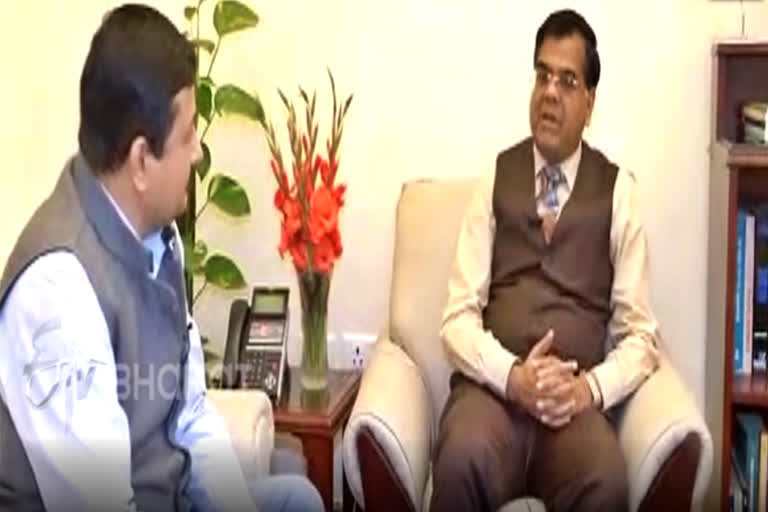New Delhi: The next year’s budget is made on the assumption that there will be no second Covid wave but if a second Covid wave indeed comes then the government will tackle it without compromising the infrastructure building programme, said a senior officer in the ministry of finance.
Despite the burden of Covid related welfare programmes such as PM Garib Kalyan and PM Garib Kalyan Ann Yojana, according to the revised estimates, the capital expenditure in the current fiscal is set to be a record Rs 4.39 lakh crore as the government stepped up infrastructure spending no later than it began unlocking the economic activity following three months of complete lockdown last year.
Next year, capital expenditure is set to be over Rs 5.54 lakh crore, a jump of over 26%.
In an exclusive interaction with ETV Bharat, expenditure secretary TV Somanathan said the budget is based on the assumption that there will be no big recurrence of Covid-19 but if it happens due to new strains of Coronavirus, which are considered far more lethal, then the government was better prepared to handle it.
TV Somanathan said the government managed the situation last year when it was totally unprepared.
“Now we are better prepared, if it comes we will readjust our priorities,” he told ETV Bharat.
The top officer, who charted out the finance ministry’s expenditure priorities during one of the worst crises in the history of independent India, says the government will readjust and move money from one requirement to another to tackle the emerging situation but will not compromise on infrastructure development which is crucial for revival of the economy.
“We will try to sustain our infrastructure expenditure as far as possible,” TV Somanathan asserted.
The highly contagious SarS-CoV-2 virus has killed over 2.3 million people worldwide and over 1,55,000 people in the country in the last one year, destroying lives and livelihoods. While according to an initial estimate of the International Monetary Fund, the world economy was expected to suffer a loss of over 9 trillion dollar, India's economy is expected to shrink by nearly 8% in the current fiscal.
Prime Minister Modi’s government is banking on a large scale infrastructure development programme, which envisions building highways, railways, airports and seaports among other things under the national infrastructure pipeline scheme to kick-start the economy hit hard by the adverse economic impact of Covid-19 global pandemic.
Also read: Privatization of PSUs will create more sustainable jobs: Top officer
“Even in the middle of this pandemic, our capital budget was Rs 4.02 lakh crore but our revised estimate is 4.39 lakh crore,” he said
“It shows the priority that we are giving to infrastructure.”
In response to a question, TV Somanathan said it was difficult to predict when the Centre’s capital expenditure will exceed its interest payments. At present, nearly one fourth the Union budget goes into interest payment alone.
The government estimates that in the next fiscal, its interest outgo will cross a record Rs 8 lakh crore, which will be over 23% of the total budgeted expenditure for the year which is pegged at Rs 34.83 lakh crore.
TV Somanathan says it is a long term process and the situation will not change unless the government cuts down its subsidy bill.
“Interest is not something that we can do anything about in the short run. Subsidies can be controlled and they need to be controlled but that is a very difficult task,” he said.
While advocating the need to control the ballooning subsidy bill, which touched nearly Rs 6 lakh crore this year due to arrear payments, Somanathan acknowledged that some of them were essential to protect the poor and vulnerable section of the society.
He, however, underscores that the situation is changing in recent years.
The Union government’s capital expenditure is set to rise from Rs 3.35 lakh crore in 2019-20 (actual) to Rs 4.39 lakh crore in 2020-21 (revised estimate), with the allocation for the next year estimated at over Rs 5.54 lakh crore.
“In two years, it is an increase of over 60%. It is very substantial,” Somanathan told ETV Bharat.



